For Greater Glory: The True Story of Cristiada Blu-ray Movie
HomeFor Greater Glory: The True Story of Cristiada Blu-ray Movie 
Blu-ray + DVDArc Entertainment | 2012 | 145 min | Rated R | Sep 11, 2012
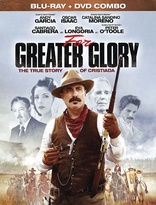
Movie rating
6.6 | / 10 |
Blu-ray rating
| Users | 2.0 | |
| Reviewer | 3.0 | |
| Overall | 3.0 |
Overview
For Greater Glory: The True Story of Cristiada (2012)
A chronicle of the Cristeros War (1926-1929), a popular revolt against efforts by the Mexican government to stamp out the Catholic Church. Seeking professional leadership, the rebels hire General Gorostieta, a retired military man who, ironically, is an atheist, but finds himself inspired by the dedication and passion of the priests and peasants he molds into an army.
Starring: Andy Garcia, Oscar Isaac, Catalina Sandino Moreno, Santiago Cabrera, Mauricio KuriDirector: Dean Wright
| History | Uncertain |
| War | Uncertain |
| Drama | Uncertain |
Specifications
Video
Video codec: MPEG-4 AVC
Video resolution: 1080p
Aspect ratio: 2.39:1
Original aspect ratio: 2.39:1
Audio
English: DTS-HD Master Audio 5.1
Spanish: DTS-HD Master Audio 5.1
Subtitles
English SDH, Spanish
Discs
50GB Blu-ray Disc
Two-disc set (1 BD, 1 DVD)
DVD copy
Packaging
Slipcover in original pressing
Playback
Region A (B, C untested)
Review
Rating summary
| Movie | 2.5 | |
| Video | 5.0 | |
| Audio | 4.0 | |
| Extras | 2.0 | |
| Overall | 3.0 |
For Greater Glory: The True Story of Cristiada Blu-ray Movie Review
There Will Be Blood
Reviewed by Michael Reuben September 10, 2012History is written in many drafts, and the first is often a mess, with loose ends, unexplored avenues and unexamined perspectives. Dramatized history is even more of a challenge. The dramatist usually starts from events with which the audience is generally familiar—World War II, Prohibition, the Civil War, the War of Independence—then looks for a story of individuals through which to personalize these events and thereby bring them closer. Every so often, though, some brave (or foolhardy) soul undertakes to recover a piece of history through drama. It's a risky undertaking, especially if your preferred form of drama is cinema, which is good for spectacle but not so good at presenting the interplay of social and economic forces. The makers of For Greater Glory sought to write the first draft of a chapter of Mexican history that has been largely forgotten, probably because the Mexican government ends up as the villain of the story—and despite the cliche, history isn't always written by the victors. At least as portrayed in For Greater Glory, the government ultimately lost its war against the Catholic Church, but it remained in power, which meant it still controlled the educational system and the official record. As a result, the so-called "Cristeros War" of 1926-1929 has been largely forgotten, except by a handful of historians and the descendants of its participants and victims. Director Dean Wright, a former visual effects supervisor and second unit director for the Narnia films and two of the Lord of the Rings films, is no stranger to huge productions or big themes. However, the screenwriter, Mike Love, was a veteran of more intimate tales (e.g., Gaby: A True Story) and had never attempted anything approaching the scale of the Cristeros War, with its numerous character arcs, multiple locales and various subplots. The resulting film is visually arresting but too often leaves key plot points unresolved or unexplained and suffers from both a lack of narrative clarity and a simplistic perspective (the church is all good, the government is pure evil) that eventually feels like propaganda.
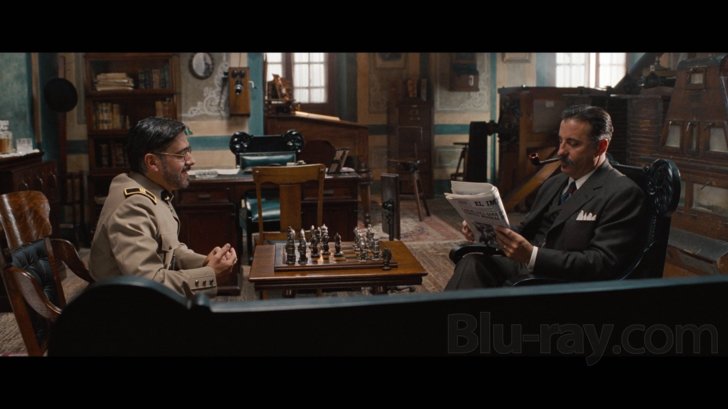
Opening text screens describe the anti-Catholic provisions of the Mexican Constitution of 1917, which were not enforced until President Plutarco Elías Calles (Rubén Blades) begins a crackdown on the church in 1926. Even a casual student of history will sense something missing, because there is no attempt to provide context or background for Calles' opposition to the church. The film portrays him as a hothouse fanatic, who consults with his ministers, addresses the press, meets with the U.S. ambassador, Dwight Morrow (Bruce Greenwood), but has no connection to the nation's people. In fact, Calles was elected in 1924 as a populist representative of Mexico's poor and dispossessed, and the church consistently sided with the wealthy landowners, which is why it was disfavored in the Constitution. Two years into his presidency, Calles determined that the church's continued influence in Mexico constituted a sufficient threat that he embarked on a campaign of brutal and bloody repression that calls to mind the maxim attributed to many great pragmatists: It was worse than a crime; it was a mistake. His actions allowed the Catholic faithful to galvanize popular support in the name of religious freedom and to reclaim the mantle of martyrdom that has always been central to Catholic spirituality. For Greater Glory depicts the consequences of Calles' actions, but fails to put them in a meaningful context. As far as the filmmakers are concerned, Calles was little more than a madman. The film's central figure is Enrique Gorostieta Velarde (Andy Garcia), a decorated general who successfully fought Zapata and is now trying to live a peaceful retirement with his much younger wife, Tulita (Eva Longoria), and their two daughters. An atheist himself, Gorostieta defers to his wife's wishes in raising their children Catholic. When they are prevented from taking their daughters to religious instruction by the Calles crackdown, he reassures Tulita that the delay in their children's first communion is only temporary. A realist such as Gorostieta understands that the government's effort to close the churches is doomed to failure. But Calles and his federal troops ("Federales") persist, and their actions are ruthless. Federales burst in on Catholic worshippers and open fire. A gentle priest, Father Christopher (Peter O'Toole), who has spent 70 years in Mexico, is dragged from his church and publicly executed by firing squad. The event is witnessed by the youngster, José Luis Sánchez del Rio (Mauricio Kuri), whom Father Christopher was training as an altar boy, and it radicalizes him instantly. In that one vignette, the folly of Calles' enterprise becomes manifest. Soon, thousands across the country have risen in opposition, including local police who provide ammunition, which brave and willing women like Adrianna (Catalina Sandino Moreno) smuggle to the rebels. The rebels themselves are a diverse and uncoordinated group, ranging from a fighting priest like Father Vega (Santiago Cabrera) to Victoriano Ramirez (Oscar Isaac), a gunslinger and outlaw who acquires the name "El Quatorce" (which means "The Fourteen") after killing fourteen Federales who tried to ambush him at home. They're bold and courageous men, but they lack coordination and an overall strategy, which is why they approach the retired general, Gorosteita, with an appeal for his leadership. He drives a hard bargain (twice what a general would earn working for Calles), but in truth he's eager for the challenge, because retirement doesn't suit him. (He's earning a living manufacturing soap.) Once General Gorosteita takes command, For Greater Glory focuses less on major battle engagements than on the general's strategies, his presiding over training, and his relations with his commanders. As portrayed by Andy Garcia, the general has a quietly authoritative presence and a natural instinct for the best way to inspire loyalty in each person he encounters. When the boy José and his friend Lalo (Adrian Alonso) make their way to the rebel camp and ask to fight, the general lets them stay but puts them to work around the camp. When El Quatorce insists on doing things his way, the general doesn't argue, but then he saves the headstrong outlaw from the very ambush against which the general had cautioned him. El Quatorce never questions his superior officer again. Meanwhile, U.S. President Calvin Coolidge (Bruce McGill) has dispatched his ambassador to try to calm the situation, because valuable oil leases are at stake. In a classic American move, Ambassador Morrow first offers Mexican President Calles guns and other material support against the rebels in exchange for an extension of the oil leases. Eventually, however, the U.S. wants the conflict resolved, and Morrow is instrumental in negotiating a formal end of hostilities in 1929, as the film's closing text states (omitting the fact that Calles was no longer President of Mexico). Approximately 90,000 people on both sides have died in the war by that point. Decades later, many of those fighting the government are declared martyrs and beatified by the Catholic Chuch. In his review when For Great Glory was in theaters, Roger Ebert complained that the film suffered from "pro-Catholic tunnel vision". He went on to suggest that the film should have included "all religions under the banner of religious liberty", which is an interesting idea in theory but hardly practical for a story set in Mexico in the 1920s. "All" religions weren't under attack then. But Ebert had a point. Love's script and Wright's direction accept at face value the Cristeros' fight as a battle for religious liberty; it was, but it was also a struggle over who would control the future direction of Mexico. By omitting the latter element and choosing to focus so graphically on the bloody martyrdoms of Catholics at the hands of the godless, Love and Wright are engaging in historical revisionism as much as the Mexican government that prevented the Cristeros War from entering the official annals of the country's history. And by implicitly defining "religion" in terms of death and gory sacrifice, they've conveyed peculiarly narrow concepts of both freedom and spirituality. These are two richly complex areas that deserved more thoughtful consideration than For Greater Glory has to offer. The film is an intriguing first draft, but it's still very rough.
For Greater Glory: The True Story of Cristiada Blu-ray Movie, Video Quality 
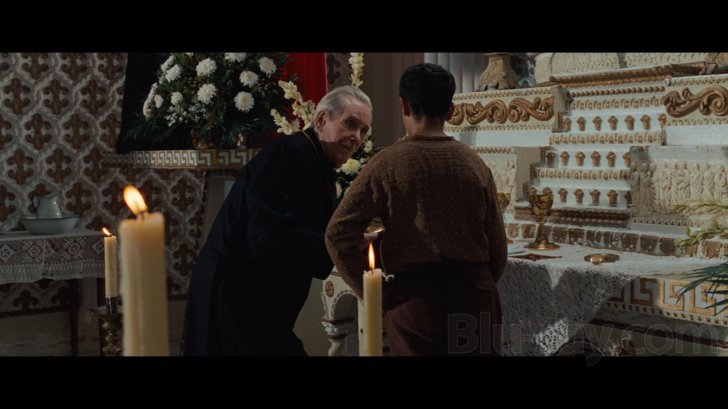
As best as I can tell from the credits, For Greater Glory was shot on film and finished on a digital intermediate; the cinematographer was Mexican cameraman Eduardo Martínez Solares. Like many productions shot on contemporary stocks and scanned at high resolution, the result is so crystal clear and free of noise that the finished product could easily be mistaken for digital photography. The image on ARC Entertainment's 1080p, AVC-encoded Blu-ray is exceptionally clean, sharp and free of noise. Virtually any trace of the film's original grain structure has been eliminated at the DI stage. Black levels are excellent, and fine detail never falters, whether in brightly lit portions of the frame or in shadow. The color palette emphasizes warm and reddish hues, consistent with the climate and locale, although cooler tones predominate in night scenes and in the shadowy spaces preferred by President Calle. Since the Blu-ray was presumably sourced from digital files, there was no interim analog stage to create artifacts, and the use of a BD-50 has eliminated any issue with compression. (The disc image occupies a healthy 40.8 GBs.)
For Greater Glory: The True Story of Cristiada Blu-ray Movie, Audio Quality 
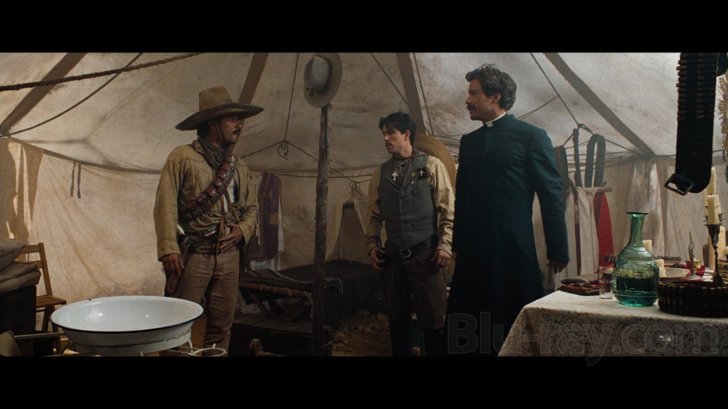
Oscar winner Dane A. Davis (The Matrix) designed the sound for For Greater Glory, and all the minutia of his work can be appreciated on the Blu-ray's DTS-HD MA 5.1 track. The rear channels are full of subtle effects that have been carefully modulated to reinforce a sense of different locations without distracting attention from the action on screen: sounds of horses, carriages in the streets, trains, distant wind, gunshot reverberations in canyons, etc. The film may not be a studio production, but the sound engineering is the equal of anything released by a studio in recent memory. Dialogue is clear at all times, and the majestic score by multi-Oscar winner James Horner (Titanic, Avatar and Braveheart, among others) soars melodically in all the right places.
For Greater Glory: The True Story of Cristiada Blu-ray Movie, Special Features and Extras 
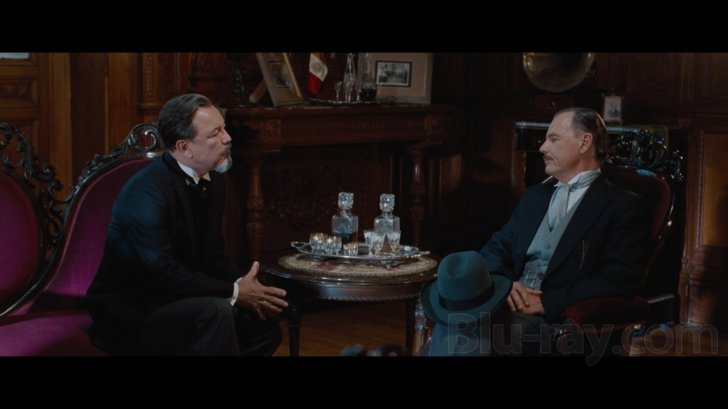
- The True Story of the Cristeros (HD, 1080i; 1.78:1 & 2.39:1; 26:49): Using archival photos and footage, as well as contemporary interviews with historians and church officials and excerpts from the film, part of this documentary provides a more prosaic account of the history behind For Greater Glory. It does not, however, supply additional context. Another part describes the making of the film, including interviews with director Wright, producer Pablo Barroso, who was a prime mover of the project, and Dr. Jean Meyer, whose book about the Cristero War was one of the principal sources for the script.
- Theatrical Trailer (HD, 1080p; 2.39:1; 2:29): At the very least, it's a trailer that accurately represents the film.
- Additional Trailers: At startup the disc plays trailers (in 1080p) for The Way and Seven Days in Utopia and (in 480i) for The Greatest Miracle. These can be skipped with the chapter forward button and are not otherwise available once the disc loads.
For Greater Glory: The True Story of Cristiada Blu-ray Movie, Overall Score and Recommendation 

For Greater Glory is an admirable technical achievement, and it offers several notable performances, especially by Andy Garcia and Oscar Isaac, as well as an introduction to a heretofore little known piece of 20th Century history. Individual scenes are striking, but on the whole the film has too many problems for me to recommend it except as a rental. Some of the problems are basic failures of narrative exposition. (For example, why does Father Vega's robbery of a train carrying gold turn into a civilian massacre that provides the government with a propaganda victory against the Cristeros? Despite numerous opportunities, screenwriter Love never even hints at an explanation.) Others result from the portrayal of the Calles government as motivated by nothing more than a lust for power. With an occasional exception, real people are psychologically more complex than a Bond villain, and historical drama shortchanges its audience by failing to explore their motivations. Recommended for a rental.
Other editions
For Greater Glory: The True Story of Cristiada: Other Editions
Similar titles
Similar titles you might also like

The Conspirator
2010

Khartoum
1966

Alexander the Great
1956

Emperor
2012

The Boy in the Striped Pajamas
2008

The Killing Fields
1984

The Fall of the Roman Empire
1964

The Alamo
2004

The Longest Day
1962

The 12th Man
Den 12. mann
2017

Winter in Wartime
Oorlogswinter
2008

Land of Mine
Under Sandet
2015

A Bridge Too Far
1977

The Last Command
1955

Fat Man and Little Boy
1989

Che: Part One
2008

Michael Collins
Warner Archive Collection
1996

Holocaust
1978

Breaker Morant
1980

Is Paris Burning?
Paris brűle-t-il?
1966
